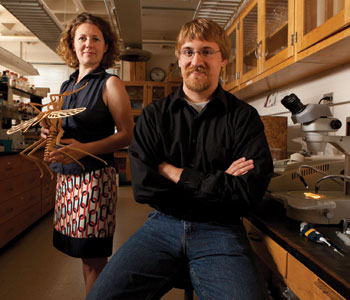
Irina Vyazunova and Tim Carlson, recipients of the Feir fellowship.
Dorothy Feir (PhD ’60 ALS), was a groundbreaker. First female faculty member in the St. Louis University biology department. First woman elected to the governing board of the Entomological Society of America. First female president of the society.
With the Lillian and Alex Feir Graduate Student Fellowship Fund, she is making it possible for University of Wisconsin-Madison entomology graduate students to help discover new ways to protect crops and people from insect problems.
Protecting Leeks, Tomatoes And Roses
Tim Carlson (BS ’08 ALS) has always been interested in critters, insects in particular. Growing up outside of Racine, he spent a lot of time at the farms of family friends, caring for steers and sheep, even showing a Brown Swiss cow at county fairs. His dad was interested in nature; a pond across the street from his home gave him a chance to chase tadpoles and water bugs.
“A lot of people have a negative view of insects for the most part,” Carlson said. “Our lives cannot continue without out them.” Insects pollinate plants. They are animals. “I think it’s fascinating,” he said.
A fellowship from the Lillian and Alex Feir Graduate Student Fellowship Fund is helping Carlson pursue his master’s degree in entomology while working in Professor Tom German’s lab. The researchers are looking for ways to deliver BT, an insecticidal toxin, to control thrips, which attack plants from leeks, peppers and tomatoes to ornamental crabs and roses.
“For me, the fellowship makes all the difference in the world,” he said. “It’s enough to support me, and I can focus on working here.”
Stopping Mosquitoes
Irina Vyazunova (PhD ’08 ALS) who received the Feir fellowship as she worked on her doctorate in entomology, worked in Professor Que Lan’s lab to study developmental changes in mosquitoes, looking for environmentally friendly compounds to control the insects. The lab targeted the gene that carries sterol, trying to understand where and when it was expressed.
Unlike humans who can make needed cholesterol for their bodies, insects cannot make sterols. That leaves a weak spot in their physiology, Vyazunova said. The lab was looking for ways to inhibit the gene.
As an international student from the Russian Federation, Vyazunova didn’t have the option of other jobs, so the Feir Fellowship gave her a sense of security of knowing she didn’t need to rely on her advisor to support her research. “That’s a great feeling,” she said. “If you have your own funding, it’s like living independently from your parents.”
Vyazunova is working in the School of Pharmacy. “I use the same tools to study cancer as I used to study mosquitoes,” she said.
Encouraging Curiosity
Feir was one of the earliest women to earn a PhD in entomology at the UW-Madison, Department Chair Walt Goodman said. Years later, Feir told him how much she resented being asked to make coffee every day for the department. There were no women faculty in 1960; today, the department’s roster includes four women and seven men.
Feir’s love of insects began as a child, according to a Missouri Historical Society biography of her. “She has fond memories of spending time with her grandmother who was very knowledgeable about insects and instilled in her a love of nature and science.”
“For me, the fellowship makes all the difference in the world. It’s enough to support me, and I can focus on working here.”
Tim Carlson (’08 BS, ALS)
The milkweed bug was Feir’s chosen research insect, although she also was the first to identify the bacteria that cause Lyme disease in Missouri ticks. “Surely one of the aims of biological research is to understand the sum of the parts, i.e., the whole animal and not just the isolated mitochondria or nervous system or behavior,” she wrote in 1974. “Some species lend themselves readily to laboratory and field research and become widely used experimental tools, even though there is no special interest in that species per se. The large milkweed bug, oncopeltus fsciatus, is one of those.”
Feir is well-known in the entomology world, Vyazunova said. “She was very generous.”
Feir’s generosity included a student travel award with the Entomological Society of America in honor of her parents, who encouraged education and travel experiences for their daughters. A dog lover, she also gave generously to the Humane Society of Missouri and was a friend of the Missouri Historical Society. “How can you appreciate who you are if you don’t know what came before you?” she asked.
Feir was especially interested in helping graduate students, Goodman said. When she would have restricted her second fellowship to U.S. citizens, meeting Vyazunova, a potential recipient, convinced her to skip the restriction.
The Feir fellowships give the department the ability to respond quickly to graduate student need. “We can in a very short order offer a fellowship to a very good student,” Goodman said. Since the fellowships also are reserved for new recruits, they help the department attract what he called “the best of the best.”
